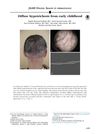 June 2023 in “QJM: An International Journal of Medicine”
June 2023 in “QJM: An International Journal of Medicine” Diagnosing diffuse alopecia is challenging due to its varied appearance and underlying causes.
 January 2023 in “Al-Azhar International Medical Journal /Al-Azhar International Medical Journal”
January 2023 in “Al-Azhar International Medical Journal /Al-Azhar International Medical Journal” Panoramic Trichoscopy is a new, better way to assess widespread hair loss.
[object Object]  December 2022 in “Gastroenterology”
December 2022 in “Gastroenterology” A man with Cronkhite-Canada syndrome improved significantly with immunosuppressive therapy.
 November 2022 in “Journal of Drug Delivery and Therapeutics”
November 2022 in “Journal of Drug Delivery and Therapeutics” Unani medicine links diffuse hair loss to poor skin pore function and body dryness, leading to thinning hair.
 October 2022 in “The Egyptian Journal of Hospital Medicine”
October 2022 in “The Egyptian Journal of Hospital Medicine” Diffuse hair loss in women is often linked to thyroid problems.
 January 2022 in “Indian journal of dermatopathology and diagnostic dermatology”
January 2022 in “Indian journal of dermatopathology and diagnostic dermatology” Women with diffuse hair loss often have lower iron and vitamin D levels, but their thyroid function is typically normal.
 January 2022 in “Clinical Cases in Dermatology”
January 2022 in “Clinical Cases in Dermatology” Stress can cause temporary hair loss, which usually gets better after the stress is gone.
 August 2021 in “Acta medica Philippina”
August 2021 in “Acta medica Philippina” A girl's hair loss was found to be caused by both a hair-pulling disorder and another hair loss condition.
 June 2021 in “Elsevier eBooks”
June 2021 in “Elsevier eBooks” The document's conclusion cannot be summarized because it is not readable or understandable.
January 2021 in “Journal of Clinical and Diagnostic Research” Diffuse hair loss significantly worsens quality of life for females, especially younger women and those with long-term hair loss.
 October 2020 in “Медицинский совет”
October 2020 in “Медицинский совет” The document's conclusion cannot be provided as it is not accessible for parsing.
 June 2020 in “Journal of clinical and investigative dermatology”
June 2020 in “Journal of clinical and investigative dermatology” Nourkrin® Woman with Marilex® improves hair growth, appearance, and confidence in women with hair loss.
January 2019 in “Türkiye klinikleri dermatoloji dergisi” Low levels of iron, ferritin, zinc, and folic acid may contribute to hair loss in women.
 January 2019 in “Indian Dermatology Online Journal”
January 2019 in “Indian Dermatology Online Journal” Stress, hypothyroidism, drug intake, and anemia are important factors in women's diffuse hair loss.
 January 2018 in “Haydarpaşa Numune Hastanesi tıp dergisi”
January 2018 in “Haydarpaşa Numune Hastanesi tıp dergisi” The paper concludes that detailed patient history, skin exams, and lab tests are crucial for diagnosing and treating hair loss from diffuse alopecia.
 July 2017 in “The American Journal of Cosmetic Surgery”
July 2017 in “The American Journal of Cosmetic Surgery” A patient's hair loss after a browlift surgery improved on its own over 8 months.
January 2017 in “International Journal of Trichology” Vitamin D supplements might help reduce hair fall.
 September 2016 in “Journal of The American Academy of Dermatology”
September 2016 in “Journal of The American Academy of Dermatology” The girl has a genetic hair condition causing thin hair since childhood.
 April 2016 in “Journal of The American Academy of Dermatology”
April 2016 in “Journal of The American Academy of Dermatology” A woman's skin symptoms led to a diagnosis of systemic AL amyloidosis, but she died from sepsis shortly after.
[object Object] Low Vitamin D3 levels are linked to hair loss in female students in South India.
October 2015 in “CRC Press eBooks” Scalp biopsy and digital phototrichogram help diagnose and manage different types of diffuse hair loss.
 January 2015 in “Indian Dermatology Online Journal”
January 2015 in “Indian Dermatology Online Journal” The patient's hair loss is most likely due to diffuse alopecia areata.
January 2014 in “Astrocyte” Some drugs may cause hair loss in women.
December 2008 in “中華皮膚科醫學雜誌” The man's hair loss was due to syphilis, and his hair regrew after treatment.
 January 2007 in “Journal of The American Academy of Dermatology”
January 2007 in “Journal of The American Academy of Dermatology” Eating disorders can cause hair loss in patients.
April 2018 in “Rossiiskii Zhurnal Kozhnykh i Venericheskikh Boleznei” All types of alopecia involve hair follicle damage, especially in alopecia areata.
 April 2004 in “Inpharma Weekly”
April 2004 in “Inpharma Weekly” Melatonin helps hair growth in women with hair loss issues.
 83 citations,
November 2002 in “British Journal of Dermatology”
83 citations,
November 2002 in “British Journal of Dermatology” Low iron levels are not directly linked to chronic hair loss and iron supplements may not help.
 64 citations,
November 2008 in “Journal of The American Academy of Dermatology”
64 citations,
November 2008 in “Journal of The American Academy of Dermatology” A new type of rapid hair loss called ADTA usually gets better on its own within 6 months.
 59 citations,
January 2002 in “Dermatology”
59 citations,
January 2002 in “Dermatology” A new type of sudden, complete female hair loss was found, with most patients fully recovering within 6 months without needing steroid treatment.






















